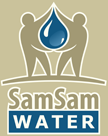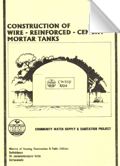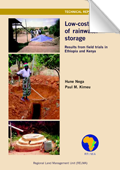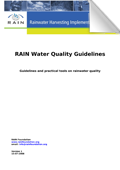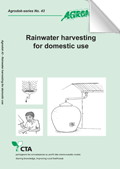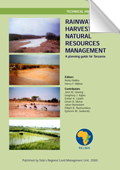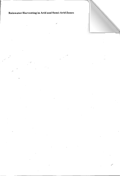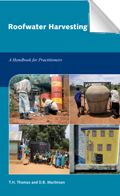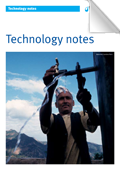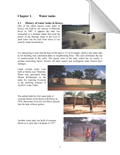
Filter by category
Or search
Loading search form...
Explanation
SamSamWater makes information on water and sanitation easy to find and accessible for all. This page contains a database with practical information, data and (GIS)maps.
We believe information should be shared to make water and sanitation projects more successful. The information in the database is gathered from numerous sources, such as research institutes, companies, NGOs and government organisations.
Do you have information we can integrate into this database, or if you have comments or questions, please contact us!
13 items found within the categories:
Roofwater harvesting
Clear search filter.
Neil Herath, Comminity Water Supply & Sanitation Project (CWSSP), Ministry of Housing, Construction & Public Utilities, Sri Lanka (1995)
Kithinji Mutunga, Will Critchley, Sida's Regional Land Management Unit (2002)
RAIN Foundation, RAIN Foundation (2008)
Janette Worm, Tim van Hattum, Agromisa (2006)
Nuhu Hatibu, Henry F. Mahoo, Sida's Regional Land Management Unit (2000)
Th.M. Boers, ILRI (1994)
T.H. Thomas, D.B. Martinson, IRC (2007)
NWP, NWP (2007)
WaterAid, WaterAid (2007)
Erik Nissen-Petersen, DANIDA (2006)
Roofwater harvesting
Clear search filter.
Akvopedia from Akvo.org
Wikipedia-like knowledgebase on water and sanitation. Contains many useful smart and affordable technical solutions and effective approaches.
Appropedia
Wikipedia-like knowledgebase on collaborative solutions in sustainability, poverty reduction and international development. Including sections on Water and Health.
Construction of wire-reinforced cement mortar tanks
Neil Herath, Comminity Water Supply & Sanitation Project (CWSSP), Ministry of Housing, Construction & Public Utilities, Sri Lanka (1995)
this document has been scanned from earlier manuals and standardizations prepared by Neil Herath for CWSSP – Sri Lanka ( April 1995), and as Manual 3 of the Technical Manual Series on Rural Water Supply and Sanitation, Gravity Water Supply Systems: design and construction (January 2005). It is redesigned to look like the 2005 CWSSP manual guiding field work on wirereinforced cement mortar tanks, commonly known as ferrocement tanks (Han Heijnen, October 2010) (source)
Low-cost methods of rainwater storage; Results from field trials in Ethiopia and Kenya
Kithinji Mutunga, Will Critchley, Sida's Regional Land Management Unit (2002)
Rainwater harvesting is one solution to the problems of water shortage in the drier areas of Africa, but its implementation presents a number of challenges, of which storage is the main one. Many people in rural areas who would like to harvest rainwater lack the resources to do so. Conventional stone, brick or ferrocement tanks are costly, and therefore there is a great need for cheaper alternatives. This publication gives an account of two trials conducted in 1998/99 to investigate some such alternatives. In Ethiopia, five different methods of tank construction were tested in the suburbs of Nazareth town in Adama Woreda. In Kenya, six different methods were tested during the same period at various locations in Machakos and Makueni Districts. A main feature of the alternative tank designs is that they are built underground, which reduces the need for reinforcement materials. (source)
Serie:
RELMA Technical Handbook Series No. 28 (all items in this serie)
Categories:
Technology and techniques
Rainwater harvesting
Roofwater harvesting
RELMA Technical Handbook Series No. 28 (all items in this serie)
Categories:
Technology and techniques
Rainwater harvesting
Roofwater harvesting
RAIN Water Quality Guidelines; Guidelines and practical tools on rainwater quality
RAIN Foundation, RAIN Foundation (2008)
This document addresses RAINs guidelines towards water quality and gives criteria and practical guidelines to improve and maintain an acceptable water quality of harvested rainwater for drinking purpose. (source)
Rainwater harvesting for domestic use
Janette Worm, Tim van Hattum, Agromisa (2006)
Book Agrodok 43: 'Rainwater harvesting for domestic use' with useful and practical applications of rainwater harvesting in developing countries. (source)
Rainwater harvesting for natural resources management; A planning guide for Tanzania
Nuhu Hatibu, Henry F. Mahoo, Sida's Regional Land Management Unit (2000)
A planning handbook that provides planners with practical tips on how rainwater harvesting can form an integrated part of district development efforts. The book also gives practical guidelines in the planning steps required to incorporate rainwater harvesting in development plans, and shows how to implement them in the farmers’ context. (source)
Serie:
RELMA Technical Handbook Series No. 22 (all items in this serie)
Categories:
Technology and techniques
Rainwater harvesting
Roofwater harvesting
Infiltration and artificial recharge
RELMA Technical Handbook Series No. 22 (all items in this serie)
Categories:
Technology and techniques
Rainwater harvesting
Roofwater harvesting
Infiltration and artificial recharge
Rainwater Harvesting in Arid and Semi-Arid Zones
Th.M. Boers, ILRI (1994)
The publication describes a procedure for the design of micro-catchments in sem-arid areas. (source)
Serie:
ILRI Publication 55 (all items in this serie)
Categories:
Rainwater harvesting
Roofwater harvesting
ILRI Publication 55 (all items in this serie)
Categories:
Rainwater harvesting
Roofwater harvesting
Roofwater Harvesting; A Handbook for Practitioners
T.H. Thomas, D.B. Martinson, IRC (2007)
A handbook with guidelines for implementing (low cost) domestic roofwater harvesting systems or programmes. (source)
Serie:
Technical Paper Series 49 (all items in this serie)
Categories:
Technology and techniques
Rainwater harvesting
Roofwater harvesting
Technical Paper Series 49 (all items in this serie)
Categories:
Technology and techniques
Rainwater harvesting
Roofwater harvesting
SamSamWater Climate Tool (precipitation & evaporation)
Local climate data is very important for water studies. However, climate data is not always available or accessible. The SamSamWater Climate Tool uses data from 28800 stations of FAOCLIM to estimate precipitation and evaporation anywhere on Earth.
Smart Water Harvesting Solutions
NWP, NWP (2007)
This booklet on Smart Water Harvesting describes a number of creative solutions in situations where ‘there seems to be no water’. It shows practical efforts to ‘create water’, especially in drought prone areas. It does not limit itself to the act of harvesting, but includes ‘capturing’ water during periods of rain, so that it is available for periods of drought. Many of the technologies highlighted in this booklet are traditional, but neglected in the modern world, as people try to become less dependent on the wiles of nature. There is an increasing awareness that rather than fighting against nature, people should co-operate with it. That is what water harvesting tries to do.
Like its equivalents on Smart Water and Smart Sanitation, this book gives examples that have proven to be effective and affordable. The book is an effective source of inspiration for local communities, civil engineers, NGOs, research institutes, donors and governments. (source)
Serie:
Smart water solutions (all items in this serie)
Categories:
Technology and techniques
Rainwater harvesting
Roofwater harvesting
Infiltration and artificial recharge
Smart water solutions (all items in this serie)
Categories:
Technology and techniques
Rainwater harvesting
Roofwater harvesting
Infiltration and artificial recharge
Technology notes
WaterAid, WaterAid (2007)
These technology notes have been prepared following many general enquiries for technical information having been received by WaterAid over the years.
Their purpose is to give an outline of the technologies used by WaterAid on long-term development projects in Africa and Asia, and to show alternatives which might be appropriate in different circumstances.
It may be possible to determine from the notes the technology which would be appropriate in a particular location.
If it is proposed to proceed with the design and construction of a project using any of the principles set out in these notes, it is strongly recommended that further details be obtained from a specialist or from the reference books which are listed at the end of the relevant section. (source)
Water from roofs
Erik Nissen-Petersen, DANIDA (2006)
A handbook for technicians and builders on survey, design, construction and maintenance of roof catchments (source)
Serie:
Water for Arid Lands Book 7 (all items in this serie)
Categories:
Technology and techniques
Rainwater harvesting
Roofwater harvesting
Water for Arid Lands Book 7 (all items in this serie)
Categories:
Technology and techniques
Rainwater harvesting
Roofwater harvesting
